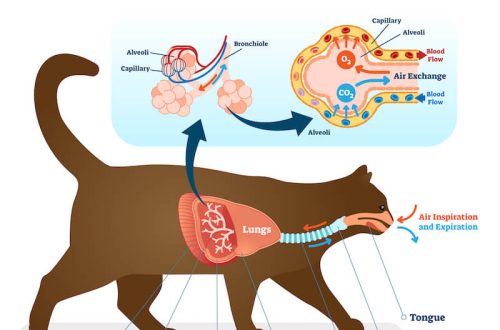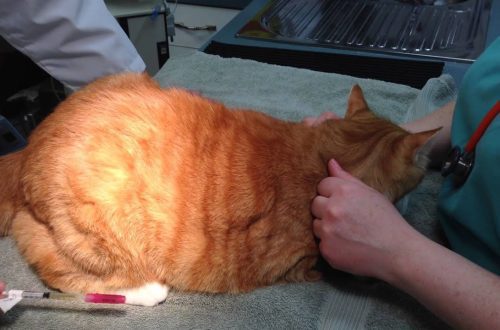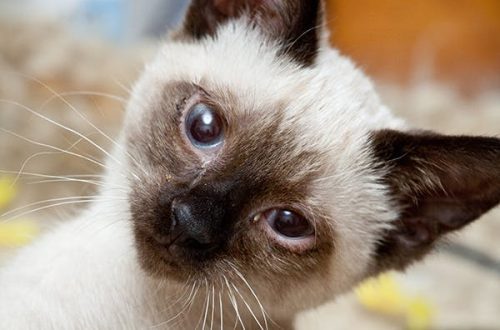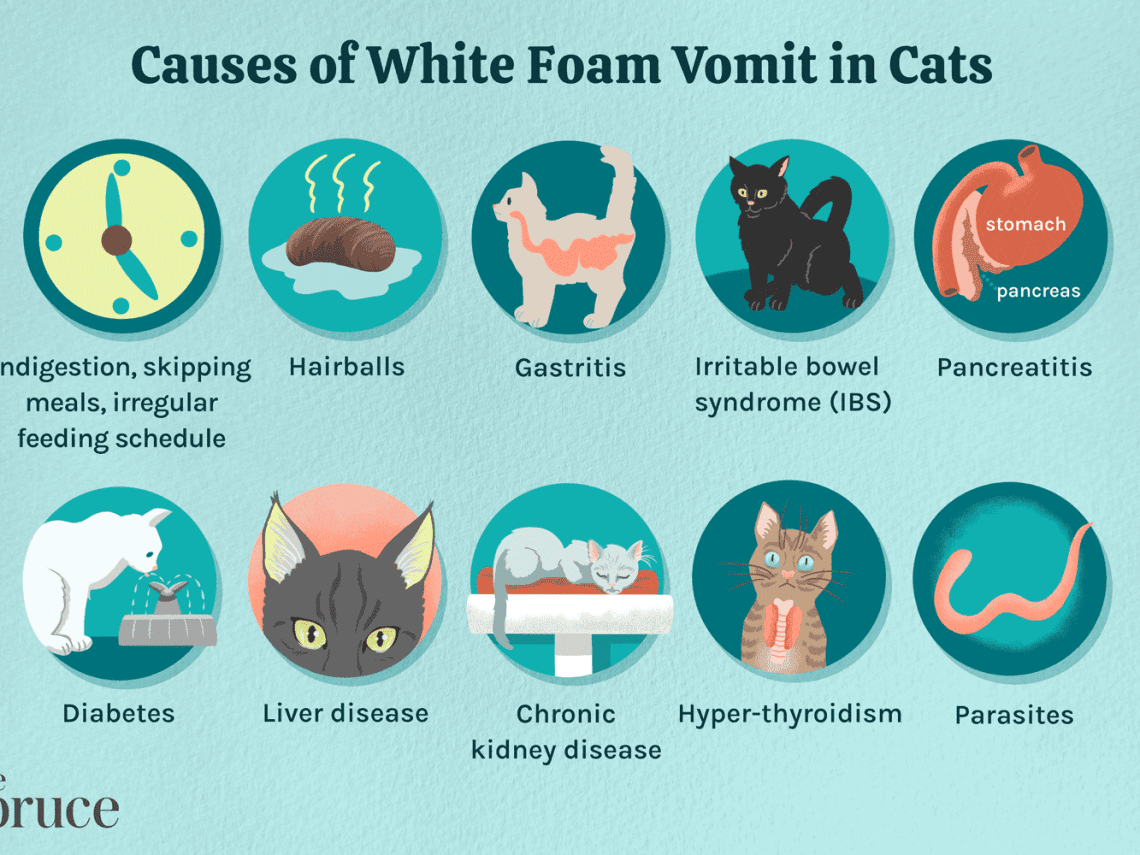
A cat or cat vomits white foam – what to do?
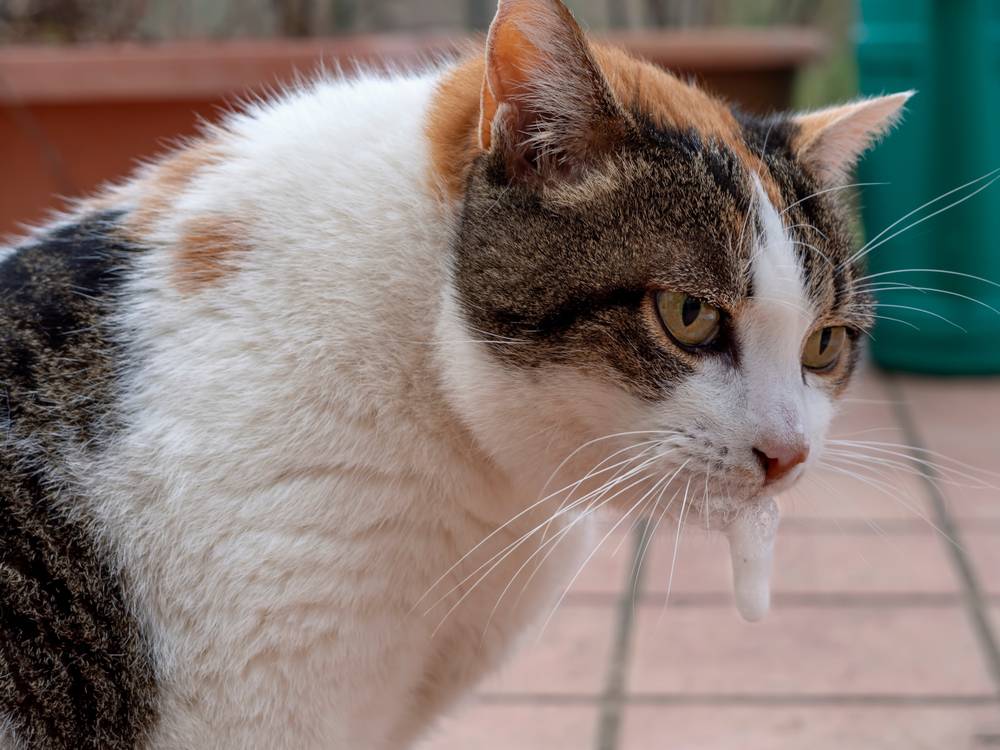
Contents
The cat vomits white foam: the main thing
For vomiting white foam in a cat, there are many reasons that do not differ in any way externally – which is why diagnosis is important.
If your cat is throwing up white foam, it’s important not to self-medicate. The condition of the pet can quickly and significantly worsen, which will lead to death.
It is important to carry out a comprehensive diagnosis in order not to miss concomitant diseases.
It is always easier to prevent a disease than to cure it. Therefore, it is important to properly feed your pet, do not forget about vaccination and treatment against parasites.
Causes of Vomiting White Foam
There are many reasons why cats vomit white foam, the most common of which are discussed below.
Natural causes
Wool
Hair vomiting is a fairly common occurrence in domestic cats, especially long-haired ones. The fact is that, when washing, cats daily swallow a huge amount of wool, which can begin to get confused and gather in a lump in the stomach. Usually she, having rolled up into a fairly voluminous sausage, comes out with vomiting.
Grass
Often, in order to avoid vomiting hair, as well as to cleanse the stomach, owners give cats to chew grass. Moreover, street cats often do this procedure on their own: the grass is not digested and causes vomiting, along with which wool and other foreign objects come out of the stomach.
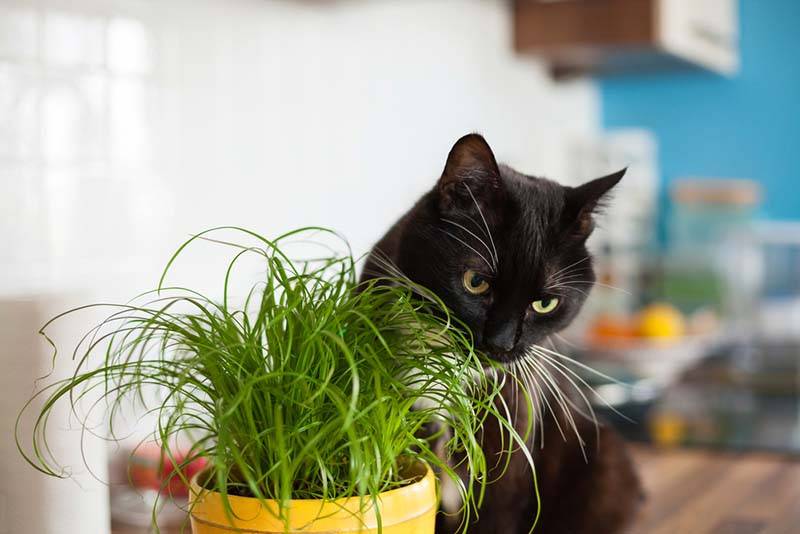
Fry food
Vomiting after eating without reference to the time of feeding often occurs in cats with inappropriate nutrition. Also, vomiting occurs after eating cold food due to irritation of the stomach receptors.
Hunger
If the cat vomited white foam, the reason for this may be hunger. The fact is that cats in nature eat often, but a little bit. They have a relatively small stomach, which is not adapted both to eating a large portion of food at once, and to prolonged hunger. Therefore, in no case should the intervals between feeding be more than 12 hours.
Binge eating
Usually vomiting as a result of overeating occurs in small kittens and outdoor animals that have been hungry for a long time. Despite the fact that cats are recommended to feed ad libitum, in this case it is important to ration portions – give food often, but a little bit.
Foreign body
Cats, especially young ones, are naturally very curious. Therefore, sometimes they can swallow inedible objects: strings, toys, bags. In some cases, foreign objects are passed out with vomit or feces, but can also cause blockage of the gastrointestinal tract. And this leads to constant vomiting of white foam and requires immediate surgical intervention. Sometimes a cat is simply sick of saliva, but this does not mean that there is no foreign object.
Pregnancy
Cats sometimes vomit during pregnancy, but this is not normal. The so-called period of toxicosis in cats is not described, and the cause of vomiting may be intoxication of the body or other pathologies of pregnancy.
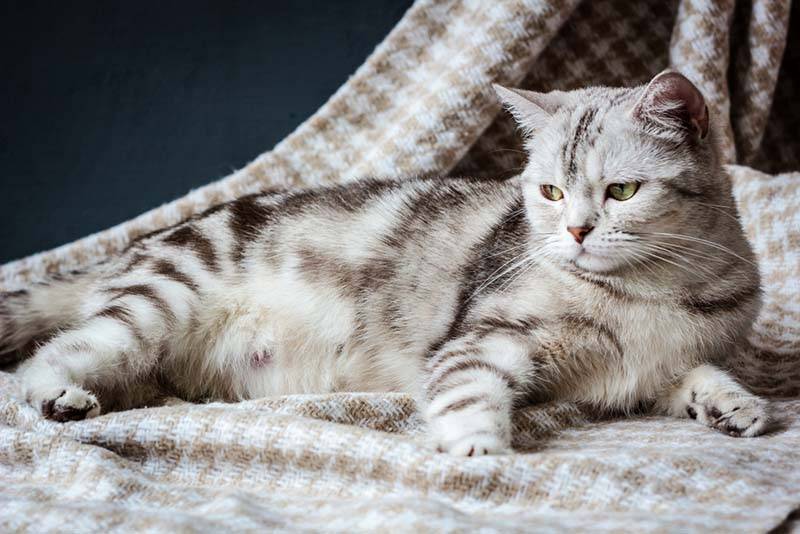
Estrus
In young cats, vomiting during estrus as a result of nervous overexcitation may be a variant of the norm. But if vomiting is repeated several times and the pet stops eating, then this is a reason to contact the veterinary clinic.
Medicines
Vomiting due to medication can occur both as a result of eating drugs, and as an adverse reaction to the prescribed treatment. In each case, the solution to the problem is developed individually, depending on the type of drug.
Stress
Most cats are very gentle creatures subject to constant stress. Moreover, in addition to the obvious causes of stress (the appearance of a new pet, small children, the arrival of guests in the house), there are also hidden from the eyes of the owner. For example, a pet may be frustrated by an unsuitable litter box, an unpleasant smell of filler, a lack of scratching posts, a quiet hiding place, or simply boredom. If during stress the cat began to vomit, he began to refuse food, it is urgent to look for reasons.
Surgical interventions
Vomiting on the first day after surgery and anesthesia is normal, as this is one of the side effects of drugs. But if vomiting appears on the second day after the operation and beyond, you should immediately contact the clinic.
Vaccination
In most cases, vaccination of pets occurs without any adverse reactions. If your pet vomited once after the procedure, do not worry. It is likely that stress after transportation and visiting the clinic by animals is to blame – often in such cases, the cat may not vomit, but white foam from the mouth.
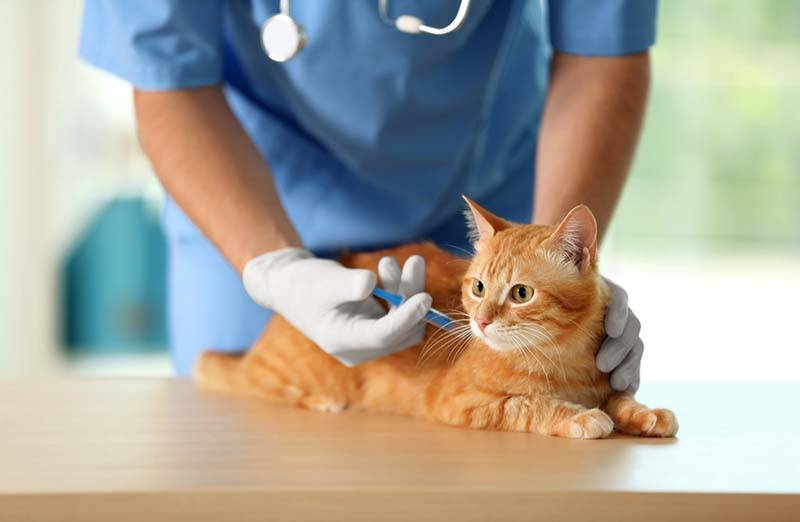
Possible illnesses
Viral infections
Viral infections, especially feline panleukopenia, can cause vomiting and refusal to eat. Self-medication in such situations is not recommended, as you can miss the time and start the disease.
Pathologies of the digestive system
Pathologies of the digestive system are among the most common causes of vomiting. These include gastritis, duodenitis, pancreatitis, cholangitis, colitis and other diseases. In these cases, only a veterinarian can deal with the cause of vomiting, make an accurate diagnosis and prescribe treatment.
Kidney
Most older pets are susceptible to kidney disease, but similar pathologies can also occur in young pets as a result of poisoning or the presence of hereditary pathologies. Vomiting in this situation develops due to poisoning of the body with metabolic products that do not remove diseased kidneys.
Sepsis
Sepsis, or blood poisoning, is a serious complication of the infectious process, trauma, as well as a consequence of non-compliance with sterility during or after surgery. Sepsis is a life-threatening condition and, unfortunately, is not always treatable. In this situation, vomiting develops due to severe intoxication of the body.
Oncology
In the modern world, neoplasms in cats, unfortunately, are becoming more common. Moreover, the tumor can develop in a very young animal. If a cat has a tumor in its stomach or intestines, it is most likely what is causing the white vomit.
Helminths
Oddly enough, most owners believe that when keeping cats in an apartment, they cannot have worms. But, as practice shows, this is a frequent and very dangerous delusion. A pet can become infected with worms not only when eating raw meat, but because of the owner, who brought their eggs with shoes into the apartment. The presence of a large number of worms in the body of a cat often leads to vomiting. Especially often due to worms, vomiting of white foam occurs in kittens.
Diagnosing the problem
In order to understand why the cat is vomiting white foam and what to do next, it is necessary to conduct a comprehensive examination. Diagnosis should include general and biochemical blood tests, abdominal ultrasound and x-rays. The fact is that vomiting is a non-specific symptom. And, as we have already discussed above, it may have a large number of causes, and there may not be other accompanying symptoms. Moreover, by prescribing symptomatic treatment (for example, malt paste for suspected vomiting due to wool or an anthelmintic drug for suspected worms), you can miss the time to diagnose and treat a more serious disease. Therefore, in most cases, in the presence of vomiting, doctors insist on a full diagnosis.
In some cases, especially to rule out a tumor, a CT scan may be needed.
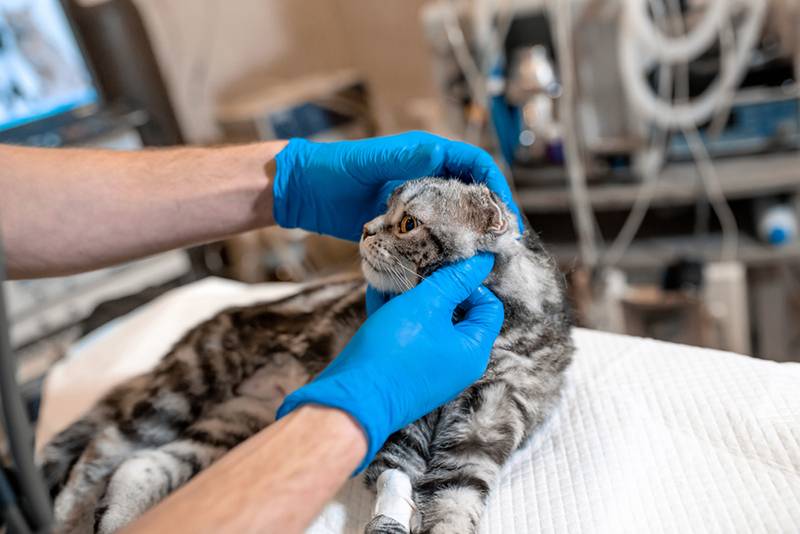
With a single vomiting caused by wool, grass eating, overeating, starvation, or vaccination, provided that the pet has an appetite, you can observe its condition without going to the clinic immediately. If vomiting recurs, other causes should be ruled out and a full examination should be performed.
Also with vomiting wool it is recommended to pay attention to the grooming of the pet – comb out more often, and during the molting period – give a special paste that helps to remove hair from the body (malt paste).
If vomiting is caused by inappropriate feed, and the pet has no other health complaints, you can try changing the diet and observe the changes. A similar principle applies to vomiting due to helminths – giving anthelmintic drugs can completely solve the problem.
With vomiting in the background pregnancy or estrus to examine the condition of the uterus and ovaries, it is necessary to conduct an ultrasound of the abdominal cavity.
Vomiting against the background deserves special attention stress. In this situation, a trip to the clinic can only aggravate the condition of the pet. In this case, a good solution would be to contact a veterinarian in an online format (ideally, a zoopsychologist). The specialist will help identify the cause of stress and, if necessary, prescribe sedatives.
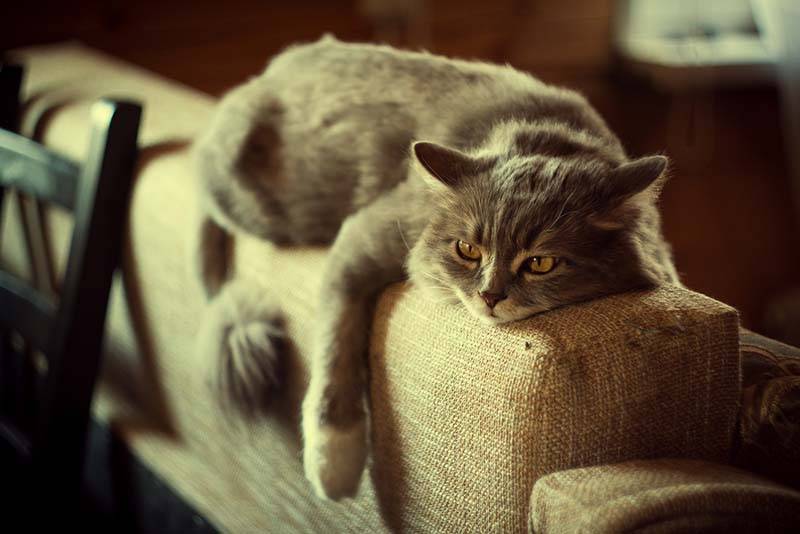
Vomiting after taking any medicines requires a mandatory visit to the clinic and the preparation of a diagnostic plan depending on the specific drug. When vomiting against the background of the use of antibacterial, painkillers and other drugs, the doctor will select an alternative treatment.
If you suspect foreign body or cancer an abdominal ultrasound and x-ray should be performed. The rest of the studies, if necessary, will be prescribed by the doctor.
When vomiting on against the background of viral infections, after surgical interventions or against the background of sepsis First of all, blood tests are required to assess the general condition of the body.
When suspected of having pathology of the digestive system or kidney disease to identify both the anatomical signs of the disease and the severity of the process, it is necessary to conduct an ultrasound of the abdominal cavity and take blood tests.
Treatment
Treatment of single vomiting caused by wool, grass, overeating, starvation or vaccinationis usually not required. If vomiting is repeated and the pet’s condition worsens (refusal to eat, lethargy), contacting the clinic is mandatory.
When vomiting due to stern you need to rethink your diet. When feeding with industrial feeds, you should try options for sensitive digestion, and when using a homemade diet, consult a nutritionist for a proper and balanced diet.
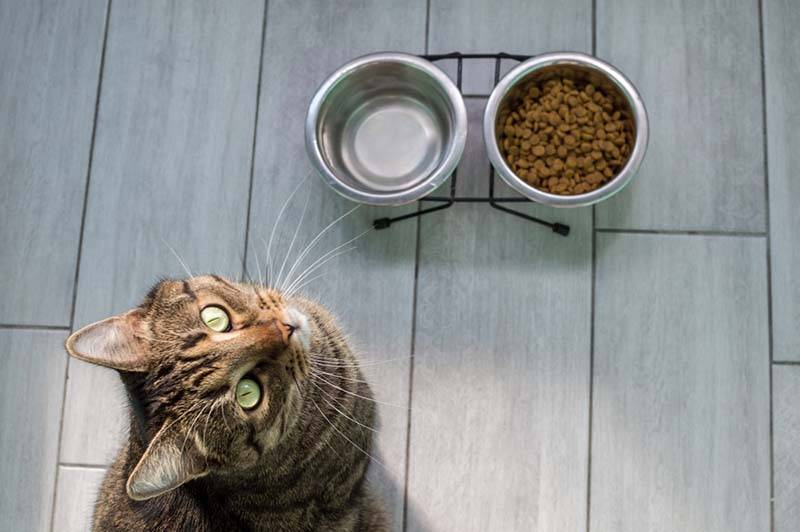
Vomiting in the background estrus or pregnancy requires treatment in the presence of any pathology. With estrus, which is constantly difficult, sterilization may be recommended, and in the pathology of pregnancy, its termination.
Vomiting in the background stress in each case requires an individual approach. Only a doctor can detect and help eliminate the cause of a cat’s stress, as well as select an individual scheme for giving sedatives.
With vomiting caused helminthsDeworming is a must. To determine the frequency of treatments and select the desired drug, it is recommended to contact a veterinary clinic or an online veterinarian. In no case should you use medications – they can poison the animal.
With vomiting caused by the presence of foreign body in the stomach or intestines of a pet, surgical intervention is necessary. In this situation, it is strongly not recommended to use petroleum jelly and other folk remedies, as you can miss precious time. When neglected, pets may develop intestinal necrosis and severe intoxication of the body, often leading to death.
With vomiting caused by other causes (drug poisoning, oncology, kidney disease, etc.), treatment is developed in each case individually and depends on many factors (the age of the pet, the presence of concomitant pathologies, the severity of the disease, etc.).
Help at home
It is possible to help a pet at home only if vomiting has occurred once and at the same time he is in good health and has no other complaints. For example, if the animal vomited the recently eaten grass, he does not need to give anything.
Also, self-administration of antiemetic drugs is not recommended, since they can not only blur the picture of the disease, but also worsen the condition of the pet (for example, when eating a foreign object).
Diet
For most gastrointestinal disorders that cause vomiting, a diet (food labeled Gastro Intestinal) can help. But it should be borne in mind that, for example, with vomiting caused by kidney disease, a different diet is needed (food marked Renal). When feeding a pet with homemade products, a consultation with a veterinarian-nutritionist is necessary to correct the diet.
What to do if a kitten vomits white foam?
If a kitten vomits white foam, in no case do not self-medicate, only doctors know what to do. Kittens have a very fast metabolism, and if they spit up white foam, they can instantly develop dehydration, which will lead to the death of the pet. Therefore, to make a diagnosis and prescribe treatment, you should definitely consult a doctor immediately.
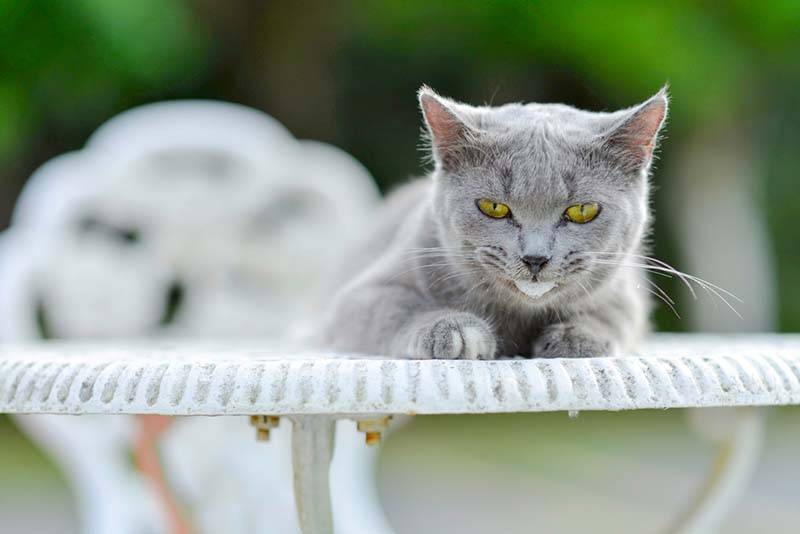
Prevention
Given the variety of reasons that can cause vomiting of white foam, the main preventive measures include proper feeding and maintenance of the pet.
For example, when feeding a pet with professional premium food, the risk of vomiting due to poisoning or diseases of the digestive system is minimized. Timely vaccination protects the pet from vomiting against the background of viral infections. To prevent vomiting of hair during the molting period of cats, it is necessary to carefully comb out and give special preparations that facilitate the removal of wool from the body (malt-paste). Cats should be fed frequently, in small portions, or given ad libitum to prevent hungry vomiting.
It is also important to ensure that the cat has leisure time in the house. When a cat interacts with special play complexes, scratching posts made of various materials, and safe toys, the risk of vomiting as a result of eating foreign objects against the background of boredom is reduced.
It is advisable to sterilize cats that are not involved in breeding to prevent incessant estrus and unwanted pregnancies.
Unfortunately, not all diseases can be prevented. Diseases of the kidneys, heart and other organs, accompanied by vomiting, are often hereditary. There is no way they can be prevented.
summary table
Cause | What to do |
Wool | Regular combing, malt paste |
Grass | Observation |
Fry food | Power change |
Hunger | Feed more often |
Binge eating | Feed more often and in small portions |
Foreign body | Treatment in a clinic |
Pregnancy | Diagnostics |
Estrus | Diagnostics |
Medicines | Treatment in a clinic |
Stress | Eliminate stress and prescribe sedatives |
Surgical interventions | Treatment in a clinic |
Viral infections | Treatment in a clinic |
Vaccination | Vomiting is often single, no treatment is required |
Pathologies of the digestive system | Treatment in a clinic |
Kidney | Treatment in a clinic |
Oncology | Treatment in a clinic |
Sepsis | Treatment in a clinic |
Helminths | Treatment for worms |
Frequently Asked Questions about White Foam Vomiting in Cats
October 31 2021
Updated: November 7, 2021



